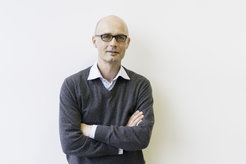Joachim Spatz a new member of the Leopoldina
The Heidelberg Max Planck Director Joachim Spatz has been elected to membership of the National Academy of Sciences Leopoldina
Joachim Spatz, Director at the Max Planck Institute for Medical Research, is a new member of the German National Academy of Sciences Leopoldina. With this election, the academy honors his scientific achievements in the field of cellular biophysics. Election to the Leopoldina is regarded as one of the highest scientific honors awarded by a German institution.

"I am very happy to join the academy, it is a great honor," says Joachim Spatz, who has been a Max Planck Director since 2004. He initially researched at the Max Planck Institute for Intelligent Systems in Stuttgart, and has been a director at the Max Planck Institute for Medical Research since 2016. In his Cellular Biophysics Department, he researches various projects studying fundamental questions in cell biology and biomedicine and in the construction of life-like materials. The investigation of cell cohorts with regard to their decision-making processes and organization and the research into the construction and workings of synthetic cells are examples. At the Leopoldina he will bring his expertise to the Physics Section.
In addition to his research and teaching at the University of Heidelberg as a professor of biophysical chemistry, Joachim Spatz is a spokesperson for the Max Planck School ‘Matter to Life’, founded in 2017. This new supra-regional doctoral program offers particularly talented and motivated students a unique training program. It trains students in the innovative research approaches in the rapidly developing and future-oriented field of construction of life-like processes and systems. What exactly is life? Can life-like processes, functions and objects be simulated and reproduced in the laboratory? He is also a member of the ‘3D Matter Made to Order’ excellence cluster of at Heidelberg University and the Karlsruhe Institute of Technology.
Two of his Heidelberg MPI colleagues, Prof. Dr. Ilme Schlichting (Department of Biomolecular Mechanisms) and Nobel laureate Prof. Dr. Stefan W. Hell (Department of Optical Nanoscopy) are also members of the Leopoldina.
German National Academy of Sciences Leopoldina
The Leopoldina originated in 1652 as a classical scholarly society and now has 1,600 members from almost all branches of science. In 2008 the Leopoldina became officially the German National Academy of Sciences and, in this capacity, was invested with two major objectives: representing the German scientific community internationally, and providing policymakers and the public with science-based advice. The Leopoldina champions the freedom and appreciation of science. It promotes a scientifically enlightened society and the responsible application of scientific knowledge for the benefit of humankind and the natural world. Leopoldina presents its policy recommendations in a scientifically qualified, independent, transparent and prospective manner, ever mindful of the standards and responsibilities of science. (Source: Leopoldina)
